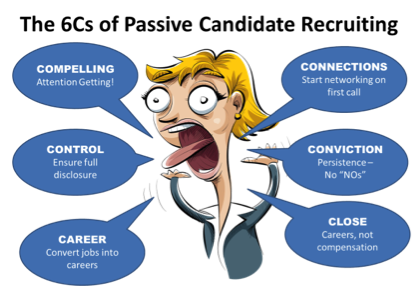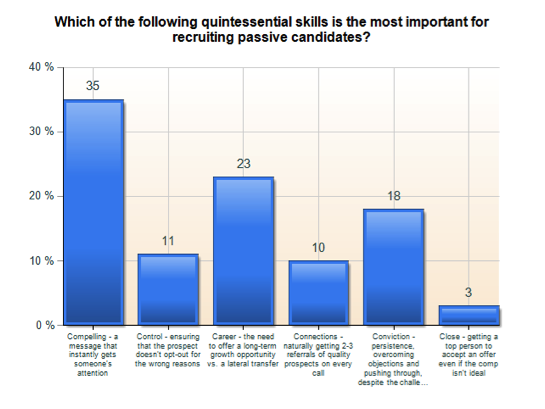 I’m concerned that most corporate recruiters don’t understand what it really takes to recruit passive candidates. In three minutes, I think you’ll agree. If you’re looking for candidates where the demand for talent outstrips supply, the ability to recruit top passive candidates will now be more difficult than ever. Those people with good jobs will hang on even tighter, and recruiters will need to use every technique in the book to pry them loose.
I’m concerned that most corporate recruiters don’t understand what it really takes to recruit passive candidates. In three minutes, I think you’ll agree. If you’re looking for candidates where the demand for talent outstrips supply, the ability to recruit top passive candidates will now be more difficult than ever. Those people with good jobs will hang on even tighter, and recruiters will need to use every technique in the book to pry them loose.
In the first article in this series I defined six skills that a recruiter must possess in order to effectively recruit passive candidates. Collectively, they’re called the 6Cs. While all are important, some are more critical than others. Here are the results of a recent poll we took of corporate and third-party recruiters asking them to define the most important of the six skills. Here’s the link to the poll so you can participate yourself. You might want to do this before you read the rest of this article. This way your responses won’t be biased.
 The top three vote getters in this poll were the need to articulate a Compelling message, the ability to quickly convert your job opening into a Career move, and the Conviction that you won’t give up despite candidate reluctance to move ahead. The least important — at least according to the poll participants — were the need to Control the conversation, the ability to develop deep Connections, and Closing the deal, without money being the primary driver. If you’re a third-party recruiter you know this is upside down. Controlling, Connecting, and Closing are the most important. Without these, Compelling messages, Career opportunities, and Conviction won’t get you any more hires.
The top three vote getters in this poll were the need to articulate a Compelling message, the ability to quickly convert your job opening into a Career move, and the Conviction that you won’t give up despite candidate reluctance to move ahead. The least important — at least according to the poll participants — were the need to Control the conversation, the ability to develop deep Connections, and Closing the deal, without money being the primary driver. If you’re a third-party recruiter you know this is upside down. Controlling, Connecting, and Closing are the most important. Without these, Compelling messages, Career opportunities, and Conviction won’t get you any more hires.
I’ll give the corporate recruiters who took the poll a break here since I didn’t define the 6Cs other than using the description shown on the chart. So let me better define and demonstrate why Controlling, Connecting, and Closing are the most important.
Why Control is #1 on the 6Cs Hit Parade
When first approached by a recruiter, passive candidates make a quick decision to engage in a conversation based on a few core pieces of information.
These generally cover factors like job title, company, location, and compensation. However, when candidates actually accept an offer, or even seriously consider one, the factors used to make this assessment are not the same. In this case they focus on job content, growth opportunity, chance to make an impact, the hiring manager’s leadership qualities, the team, and of course, compensation. But even in this case, compensation is somewhere in the middle of the list, rather than at the top. There is where “Control” comes into play and why it’s so important that the recruiter understand it thoroughly (article).
Control allows the recruiter to bridge the gap between the criteria the candidate uses to first engage in a conversation and those used to make a career decision after having a full set of information. It requires a combination of appropriate questioning, the ability to smoothly address concerns, and the ability to instantly shift the conversation from short-term to long-term. This is an essential skill if you want to increase the number of strong prospects in your candidate pool. If you want to either recruit passive candidates or network with them, you must start with a thorough understanding of the 6Cs, but be a master at Control.
Why Closing the Deal Is in the Top 3 of the 6Cs
One could argue that closing is more important than control, and should be the #1 of the 6Cs (article). Consider that if you can’t close the deal, everything else you do is a waste of time, effort, and resources. Let me be perfectly clear on this point. Closing encompasses the actual negotiation with the candidate, getting the person to accept the offer on reasonable terms, and making sure the person considers your offer on all critical short- and long-issues. Making matters more challenging is the idea that the person was not looking for a new opportunity until you called. Under this scenario that person will likely get a counteroffer that’s more competitive than what you’re offering, or worse, the person will immediately start looking and find something else better. Under this scenario, the ability to hold the deal together and close effectively takes center stage.
The fact that only 3% of those taking the poll considered this ability most important dumbfounds me.
Why Connecting Deserves to Be in the Top Three of the 6Cs
Most of you know I do a great deal of work training corporate recruiters to optimize their use of LinkedIn’s talent suite of products through networking (article). What surprises me is that corporate recruiters still think of LinkedIn as a flat list of 120 million names of largely passive candidates. For an external recruiter, it’s a 360° interconnected 3D map of every single person in the U.S. (soon the world). The idea here is that rather than finding your ideal candidate directly, consider instead contacting someone who might know the best candidate, and then provide a referral. For example, I called partners in CPA firms to identify great controllers they’ve worked with in the past. I connected with buyers at major retail chains to find out who the best salespeople they know are. And I’ve contacted product managers to find great engineers they’ve worked with on launching new products. Getting a referral like this is even better, since these people they call you back right away. And even better than that, these people are all fully qualified, since this is how you initially got their name.
So stop calling people you don’t know as a primary means for finding passive candidates. Instead start networking with everyone you do know and have them give you two or three names of the best people who are directly connected to them. If you start doing this on every call, pretty soon you’ll realize that connecting is really how you source passive candidates. (We’re holding a series of webcasts in the next few weeks demonstrating how to take connecting to another level and why you should give your TPRs a hug, rather than banish them.)
The 6Cs are the quintessential skills for any third-party recruiter who expects to survive and thrive in the current economic environment. Corporate recruiters need to think and act like TPRs if they expect to have success finding, recruiting, and hiring passive candidates in any significant quantity. While corporate recruiters might have the ability to deal with passive candidates, I’m not sure they have the hunger for it.